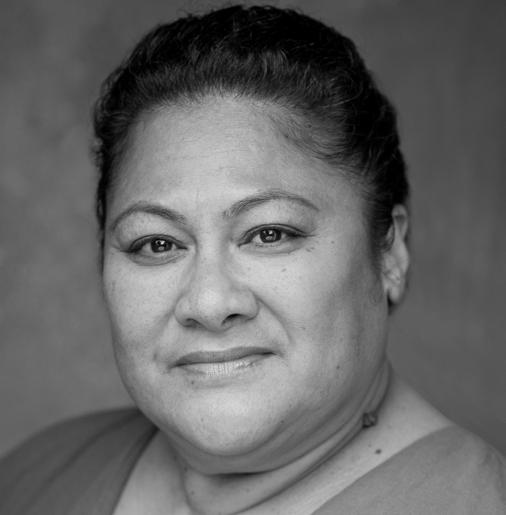
3 minute read
Directing Things That Matter
We asked director Anapela Polata’ivao about the challenges and rewards of directing the ’clean canvas’ of this new New Zealand work.
Have you read David Galler’s memoir and did that change how you directed this script?
I read the script first and then the memoir. It only deepened my understanding of what was required of the actors and myself to portray life onstage. It’s been a really good anchor.
When you first read the script, did you have a clear idea of how you wanted to direct this piece?
No, I didn’t. I never do with any work, I guess - there’s just a sense of possibilities. The next steps become more obvious as time goes by. It evolves into what it needs to be and I’m just one part of the puzzle in its development and destination, although I think there’s never really a set destination for any work. There’s always room for further investigation, for ‘’what else is lurking underneath there?’’ - even if it’s already had a production run. The actors are a crucial part of the process. There’s a whole range of different experiences in the room and everyone learns from what they bring to the floor. The beauty is we’re all collaborating to bring this baby home.
What sort of work did you do before the start of rehearsals and how do you think that comes into the rehearsal room?
I watched lots of documentaries, interviews, read articles on the Holocaust and Middlemore Hospital, what happens in ER, ICU etc. You equip yourself well enough to engage with actors and creative departments to make informed decisions on character’s arcs, set and costume design, sound and music compositions. Research leads the charge in many ways, like a road map.
What are your core values for a rehearsal room?
Openness and willingness. A willingness to make offers. Respect for other people and their space. An understanding and respect for others and their processes. My hope is for actors to not feel precious about themselves or getting things wrong. Just give it a go. I value communication and creating space for people to grow and feel safe that they can.
What are the things you watch out for during rehearsal? How do you think the rehearsal room changes over time in the run up to the production?
Actors will reveal what works and what doesn’t for them in the rehearsal process. Being able to adapt to different methods of working is important and necessary. I find it strengthens you as an actor, and keeps you open to discovering new ways of receiving information and for me it is just as crucial. My aim is to try to be an effective communicator for my actors - this doesn’t always work, howeversometimes I need to find other approaches to execute this better. Leading up to production there will be days where actors hit a roadblock or a wall, frustrated that nothing is working - this is all very normal and a crucial part of the process: The breakdown before the breakthrough. I think part of the role of the director is to be aware of the energy in the room. That’s why I think it’s important to take a moment to check in, see where people are at. have you found handling these in the rehearsal room?
What has been rewarding for you as a director during this process?
I get to work with people who love what they do as much as me. And they’re amazing human beings.
What is the difference in directing a new work compared to a work that has been performed many times?
It’s challenging, I think. You’ve got nothing to pin it against because it’s never been done before. On the flip side, you’re not influenced by what’s gone before so you have a clean canvas to paint on and that’s exciting. There’s a bit more liberty for a new work.
It’s been cathartic and freeing. Sometimes it’s been healing. We’re just trying to tell this story as truthfully and honestly as possible. It’s such a courageous thing to do to not be afraid of dealing with ourselves and our human condition. I watch these actors pour everything into it, day in day out. It’s so courageous.
Who do you want this piece to connect with?
I do hope that communities from South Auckland come to see the show because I want them to see themselves on stage. That some of our stories are being told.







